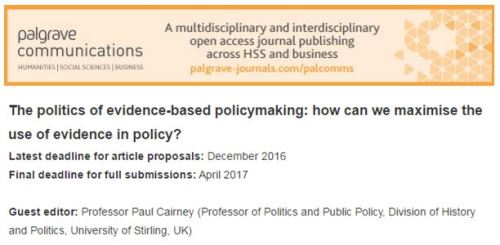Quick links to main pages
Public health, ‘prevention’, and early intervention policies
- Public health policy: blog posts, books, and articles
- ‘Prevention’ and ‘early intervention’ policy: blog posts, book, articles
Scottish politics and policy:
- blog posts on elections and the referendum
- posts, books and articles on Scottish politics and policymaking
- ‘lectures’ on Scottish politics and policymaking
Postgraduate resources:
UK politics and policymaking
draft book chapters and blog posts
More on the main sections
There are sections on public policy theory and practice, public health policy and Scottish politics (and policy) (with a separate indyref page).
There are 1000 words and 500 Words pages in which I try to condense discussions of key policymaking concepts into brief stories that you can use to become familiar with the wider literature.
Books published and in development
There is a Politics of Evidence-based Policymaking page, with a pre-publication draft of the book plus many posts and articles on this topic. Dr Emily St Denny and I are writing a book on ‘prevention’ policy. There is a nascent page on UK policymaking, but I am making very slow progress on that book (partly because the world is changing so quickly).
Teaching and learning
I developed a blog-post-driven undergraduate course POLU9SP (if you are my student, we discuss these topics in lectures and tutorial), and I have a page with details of the Master of Public Policy course at Stirling. Don’t be fooled by the term ‘Master’, which makes higher education sound like a men-only club – 100% of my first intake were women (no, I won’t tell you the n). You can also read a few posts on the PhD process.
The overall theme is comparative public policy – comparing policy theories, territories, policy areas/ issues and time periods. Everything is connected to this image of the policy process (which you can read about in 500 or 1000 Words):

You can find my CV and links to publications here and my Google Scholar page here. Believe it or not, some conference organisers need a photo of my face, so here it is.

















Pingback: The Politics of Evidence Based Policy Making - Uncle Sam's Blog
Pingback: Week 2. Two stories of British politics: the Westminster model versus Complex Government #POLU9UK | Paul Cairney: Politics & Public Policy
Pingback: We all want ‘evidence based policy making’ but how do we do it? | Paul Cairney: Politics & Public Policy
Pingback: We all want ‘evidence based policy making’ but how do we do it?
Hello, I am a part-time student and just came across your blog. Thanks a million for putting the theories in such succinct and clear manners. I just bought your book Understanding Public Policy and wish that I came across your book earlier!! Wish you a great 2017!!
Thank you – I appreciate your feedback.
Hello m a research scholar n m interested in policy research. I have few queries n could we talk through mail?
Sure – p.a.cairney@stir.ac.uk
Pingback: Why doesn’t evidence win the day in policy and policymaking? | Paul Cairney: Politics & Public Policy
Hi, I’ve gone through pretty much all of your materials and can’t express how much I appreciate how you have built a road map for understanding the abstract theories of policy. I wondered if I could request a blog topic? Policy has been described as a multidisciplinary field, drawing from sociology, economics, political science, public administration, etc. What would you say have been the most important contributions from these fields for our understanding of how policy works?
Thank you, Anne. That is a very tough question! My cop-out answer, right now, is that we can identify key themes informed by these disciplines. For example, sociological studies inform our understanding of ‘new institutionalism’ (particularly when discussing the norms and norm enforcement underpinning rules), economics helps us think through the appearance of paradoxes of collective action (and Elinor Ostrom in particular identifies new avenues of inquiry), and public administration/ political science studies are still at the heart of modern discussions of ‘bounded rationality’ (which underpins modern discussions of ‘evidence-based policymaking’). Ask me again next year and maybe I’ll have a better answer!
Thanks, Dr. Cairney. I can work with this. It’s easier to think of how all of these disciplines, together, relate to the overarching themes of public policy than to categorize how each has distinctly influenced public policy, or worse, to decide which field has influenced policy the most! With all due respect, I hope that I will not have to ask you this question again next year as I plan to have completed my course and perhaps indulge in a festive bon fire using my policy books as kindling.
Hello Paul,
I am currently revising for an exam in my Master’s programme, and your website is phenomenally useful. The podcasts have been incredibly helpful, as I can literally do my revision anywhere.
Thank you for the sublime content.
Update: I got an A on the exam. Thank you so much! I am genuinely very grateful for the content.
Pingback: Here’s why there is always an expectations gap in prevention policy | Paul Cairney: Politics & Public Policy
Hello Paul – I am a mature (read old) post-grad finally forcing myself into the never ending joys of lifelong learning. I spent years as both a British and EU civil servant. I can’t seem to free myself of the rational policy making process. Apart from the fact I don’t like that they are all front-loaded (not much on implementation), I am wondering if our bounded rationality is the very reason why they might be still valid (and essential). By that I mean, it’s a way to manage the mess of politics, public administration and people? To put it another way, I really enjoy your podcasts, but when you give the spirograph analogy I want to add that each part of the rational process, in practice, (I believe) is a spirograph. Sometimes, its a simple single line in one or more parts and sometimes every section contains multiple circles where you keep going backwards until you go forwards again. A simplistic linear example of this is those conversations between Hacker and Humphrey – broadly along the lines of: Hacker – ‘these are my preferences…’; Humphrey – ‘these are my/your constraints’ and it goes back and forth and back and forth (with various deviations…’These are the people that support my preferences…and, Minister, …these are the people that support my constraints) until we get to ‘Yes, Minister’. But that this process takes place in each policy stage with different actors sometimes distinctly and sometimes in parallel. Without the structure, it really would be, and is, chaos. I now work part-time in developing countries and I yearn for the process! Any chance of putting your podcast on iTunes? Many thanks for what you do, Sarah
Sarah, that is an interesting analogy. Yes, I agree with you: there is a difference between saying that X does not describe policymaking versus saying that we should not prescribe X as a strategy. I’d also say that we find many different ways to address bounded rationality, including institutions and networks, which project different ideas about how the process works and should work.
I once tried to work out how to put my recordings on iTunesU, but soon gave up!
Pingback: The UK government’s imaginative use of evidence to make policy | Paul Cairney: Politics & Public Policy
Pingback: We are recruiting a Lecturer or Senior Lecturer in International Politics at the University of Stirling | Paul Cairney: Politics & Public Policy
Similar to many of the other comments offered, thank you for your blog. Your posts have helped immensely throughout my graduate-level policy process 101 course. I think. We’ll know after the final exam!
Pingback: Strategic thought: the complexity of security – Defence-In-Depth
Pingback: Policy Analysis in 750 words: Rachel Meltzer and Alex Schwartz (2019) Policy Analysis as Problem Solving | Paul Cairney: Politics & Public Policy
Pingback: We are recruiting a temporary lecturer in Politics and Public Policy at the University of Stirling | Paul Cairney: Politics & Public Policy
Just give my thanks to your open-access publications. Your resume of ACF approach was really helpful in a paper I am writing right now. Greetings from Erfurt, Germany.
What would you say have been the most important contributions from these fields for our understanding of how policy works?
Pingback: We are recruiting a temporary lecturer in International Politics at the University of Stirling | Paul Cairney: Politics & Public Policy
Pingback: Policy Analysis in 750 Words: Two approaches to policy learning and transfer | Paul Cairney: Politics & Public Policy